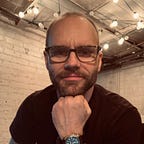Like it or not, because science changes how we see the world, every scientist is also a philosopher of science. When Isaac Newton delivered his theory of gravity, he also released a secretly radical philosophy on the world — calculism.
“Hypothesis non fingo”, he wrote, ‘I feign no hypothesis.’ Newton knew that calculus and gravity produced a tremendous _description_ of reality, but he had no _explanation_ for it. Why this invisible force could act on bodies, instantly, across great distances.
Three hundred years later, the physicist Eugene Wigner wrote a paper musing on “The Unreasonable Effectiveness of Numbers.” Unreasonably effective is a great way to describe the tsunami Newton unleashed. Any belief that science does not accurately describe — and therefore control — physical reality gets ripped apart by an unrelenting onslaught of technology so advanced it is indistinguishable from magic.
We’re drowning in unreasonably effective descriptions of reality, but starving for meaningful explanations. The world’s population has exploded as humans have become (on average) safer, healthier, and better fed than any creatures who ever lived before. But now we face diseases of despair, of sedentary affluence, disconnection from our natural state of mind and destruction of our natural environment.
The devil’s bargain Newton made reaches its peak with a saying common in the physics community: “shut up and calculate.” This anti-philosophy insists physicists ignore questions of meaning their work raises, and focus solely on its effectiveness.
I’ve noticed a strong correlation between the intensity of someone’s dedication to calculism and their unhappiness. The “shut up” part of “shut up and calculate” is not delivered with a wink and a smirk, it’s a threat. And the correlation extends outside of academia: secular calculists believe people’s value can be compared by their degrees, earning power, houses and spouses, that the meaning of life lies in maximizing efficiency.
I’m not arguing we give up on science, move to a cabin in Montana. Unreasonable effectiveness is here to stay: it’s too dang useful. But it’s high time we start looking at the other half of the universe.
Calculism describes the shared world of physical reality, the world _outside_ of our heads. But in a paradox, we can only experience that reality _inside_ our heads. Subjective experience makes up half of everything. A fascinating, sublime, mysterious half, that fills the hollow shell of objectivity with meaning.
Scientific solutions fall short, calculism can’t cut it alone.
We need scientific spirituality.
